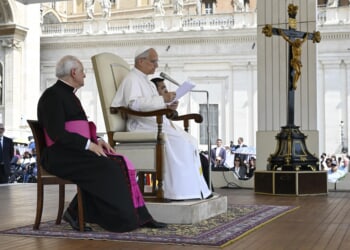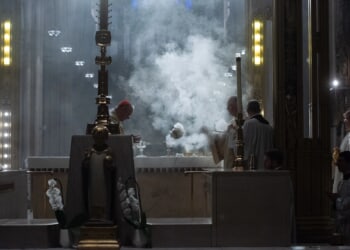A single gunshot echoed through a small Carmelite chapel in the dingy corners of San Salvador on March 24, 1980.
The chapel door had been left open in an attempt to mitigate the blanket of humid heat. Onlookers from outside looked within to hear Archbishop Óscar Romero close his homily, declaring “all those longings for justice, peace and well-being that we experience on earth become realized for us if we enlighten them with Christian hope.”
He condemned leftists for their rhetoric against American imperialism while ignoring the ongoing Soviet invasion of Afghanistan.
They were to be his final words. The eyes of the congregation followed those of Archbishop Romero himself, rising to the consecrated wafer of unleavened bread and missing the gun barrel pointing out of the back window of a nearby red Volkswagen Passat.
The eucharist had been raised high above Romero’s head in the Mass’s climax by the time the shot echoed. The highest ranking religious authority in this small, sad Central American nation tumbled to the ground with a bullet in his chest to breathe his last.
In his first homily as archbishop, Romero exhorted his flock to “keep to the center, watchfully, in the traditional way.” Hours before his assassination, he had attended a meeting of the conservative Catholic organization Opus Dei.
The archbishop denounced socialist militants and the right-wing military government at El Salvador’s helm in equally vociferous terms. Yet, by the time it was confirmed that he had been killed by the junta, Oscar Romero was already being claimed by the global left as a martyr for their cause.
Clergy adhering to the condemned “liberation theology,” a blend of Christianity and Marxism, practically made him their patron long before he was canonized as a saint and hoisted the dead man as a face for their movement in the coming decades. In doing so, leftist elements hijacked and misrepresented a deeply principled member of the priesthood who consistently stood against their political agenda.
Romero’s Rise in El Salvador
Oscar Romero was raised in the poverty typical of El Salvador with a passion for faith that led to his eventual studies in Rome and ordination in 1942. He made his way up the ecclesiastical ladder of his homeland before appointment as archbishop of San Salvador, leader of the nation’s Catholics, in 1977.
Two years later, the Salvadoran Civil War erupted in earnest. A military government resorted to death squads as they battled equally brutal socialist guerrilla militias. With his nation consumed by bloodshed, Romero spoke out against the atrocities committed against Catholics.
Eventually, he begged the Carter administration to cut off arms shipments to the Salvadoran military. Romero’s activities eventually led to his murder at the hands of the government.
Pope Francis declared on February 3, 2015, that the Salvadoran archbishop had been slain as a martyr for the Catholic faith. Romero was formally canonized as a saint three-and-a-half years later on October 14, 2018. Tens of thousands of Catholic faithful watched as the Pope completed the ceremony while wearing the bloodstained cincture that Romero had been wearing when he was killed.
The claim of Marxism is not entirely unique to leftists attempting to co-opt Romero. The traditionalist Society of Saint Pius X, a priestly fraternity in a tense limbo with the Vatican, was critical as the saint’s cause began to move forward. That the socialist hijacking of his memory was successful enough to convince some traditionalists testifies to the widespread nature of this myth.
In fact, the real Oscar Romero was repeatedly on the record as a conservative. He was selected as archbishop in a move aimed to suppress the proponents of liberation theology. At the time, the progressives within the Church protested his appointment as a victory for traditionalists hostile to the burgeoning socialist political agenda.
It was Pope John Paul II, a vigorous opponent of liberation theology, that first began the fallen prelate’s move towards canonization as a saint by declaring Romero a “Servant of God.”
Monsignor Jesús Delgado, Romero’s personal secretary, angrily dismissed those claiming Romero as a proponent of liberation theology, recalling that while proponents of the doctrine had given him their books, “he never even opened them … he never read them, he never looked at them.” Delgado’s final assessment was that Archbishop Romero “knew nothing about Liberation Theology, he did not want to know about it.”
While Romero was eventually murdered by the anti-communist junta, he was no friend to the Marxist rebel groups either. Delgado recalled that the socialist guerrillas “threatened to kill him because, they said, he blessed the coup d’etat and the agricultural reform proposed by the 1979 coup d’etat.”
For supporting the poor over the Marxist intelligentsia, “they labeled him a supporter of the reform and not of the revolution and they sentenced him to death.” Delgado was initially unsure which faction had perpetrated the tragedy, for “either side could have killed him.”
Another priest who worked closely under Romero, Monsignor Ricardo Urioste, echoed Delgado’s assessment. Urioste strongly maintains that Romero “never had a Marxist thought or Marxist ideology in his mind.” He deeply regretted that “[T]he left had politicized [Romero], putting him as their banner.”
Urioste was echoing the words of Pope Benedict XVI, who cleared Romero’s cause for canonization to move forward in 2012. The late Pope recognized that “[A]rchbishop Romero was … a man of great Christian virtue who worked for peace and against the dictatorship.” However, “there is the problem that a political side wants to take him for itself as a banner, as an emblematic figure, unjustly.”
Romero, however, was not entirely disconnected from politics, even beyond his handling of the civil war and its atrocities. He condemned leftists for their rhetoric against American imperialism while ignoring the ongoing Soviet invasion of Afghanistan.
More presciently than many that now claim his name, Oscar Romero saw that “[S]ince Marxist materialism destroys the Church’s transcendent meaning, a Marxist church would be not only self-destructive but senseless.”
The archbishop gave his life for that transcendent meaning. Those who claim Romero’s blood for their cause over his own would be well-advised to take his words to heart.
READ MORE from Shiv Parihar:
66th Annual Captive Nations Week Mourns Iron Fist of Global Marxism
Young Conservatives Should Conquer Liberal Colleges Instead of Attending Hillsdale


![Former Bravo Star Charged After Violent Assault Using a Rock-Filled Sock in Tennessee Walmart [WATCH]](https://www.right2024.com/wp-content/uploads/2025/07/Former-Bravo-Star-Charged-After-Violent-Assault-Using-a-Rock-Filled-350x250.jpg)



![NYC Man Snatches Child Off The Sidewalk, Parents Chase Him Down [WATCH]](https://www.right2024.com/wp-content/uploads/2025/07/NYC-Man-Snatches-Child-Off-The-Sidewalk-Parents-Chase-Him-350x250.jpg)
![Karoline Leavitt Levels CNN's Kaitlan Collins and Other Legacy Media Reporters [WATCH]](https://www.right2024.com/wp-content/uploads/2025/07/Karoline-Leavitt-Levels-CNNs-Kaitlan-Collins-and-Other-Legacy-Media-350x250.jpg)
![Man Arrested After Screaming at Senators During Big Beautiful Bill Debate [WATCH]](https://www.right2024.com/wp-content/uploads/2025/06/Man-Arrested-After-Screaming-at-Senators-During-Big-Beautiful-Bill-350x250.jpg)
![Leftists Lose Their Minds After Jason Kelce Celebrates Being an American [WATCH]](https://www.right2024.com/wp-content/uploads/2025/07/Leftists-Lose-Their-Minds-After-Jason-Kelce-Celebrates-Being-an-350x250.jpg)
![Illegal Alien Walked Free After Decapitating Woman, Abusing Corpse for Weeks [WATCH]](https://www.right2024.com/wp-content/uploads/2025/07/1753013138_Illegal-Alien-Walked-Free-After-Decapitating-Woman-Abusing-Corpse-for-350x250.jpg)





